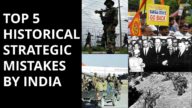
TOP 5 HISTORICAL STRATEGIC MISTAKES BY INDIA
History is unforgiving. Strategic mistakes cannot be undone in most cases. They have complex cascading effects on a nation’s future. Here are 5 strategic mistakes ,which are bleeding India till now.
KANDAHAR HIJACK
In December 1999, Indian Airlines aircraft to Kandahar was hijacked by Pakistani terrorists. The hijacking revealed how ill-prepared India was to face up to the challenges of international terrorism. Complacency in security matters allowed the hijackers to take off from Amritsar airport after 39 minutes halt for refueling, thereby letting the problem get out of control.
Relative of the Indian citizen started demonstrating and the government of the day decided to compromise with the terrorists.
India had to co-operate with the very regimes that were actively undermining its internal security.
An agreement was reached for the release of all the hostages in exchange for three Kashmiri militants including Maulana Masood Azhar.
Government’s poor crisis-management skills resulted in one of the most shameful episode in Indian history, and earned it the tag of a soft nation which it will find very difficult to shed.
THE TASHKENT AGREEMENT & RETURN OF HAJI PIR PASS
Following the cease-fire after the Indo-Pak War of 1965, a Russian sponsored agreement was signed between India and Pakistan in Tashkent on 10 January 1966.
Under the agreement, India agreed to return the strategic Haji Pir pass to Pakistan which it had captured in August 1965 against heavy odds and at a huge human cost.
It was a mistake of monumental proportions due to the following reasons:
1. The pass connects Poonch and Uri sectors in Jammu and Kashmir and reduces the distance between the two sectors to 15 km whereas the alternate route is about 200 km
2. The pass is being effectively used by Pakistan to sponsor infiltration of terrorists into India.
3. India got nothing in return except an undertaking by Pakistan to not have future wars, an undertaking which meant little as Pakistan never had any intention of honoring it.
Inability to resist Russian pressure was a result of the boneless Indian foreign policy and shortsighted leadership.
IMDT ACT & IMMIGRATION IN ASSAM
It is a standard practice all over the world that the burden of proving one’s status as a legitimate citizen of a country falls on the accused. It was same for India under Foreigners Act, 1946.
In one of the most short-sighted moves, Indian government passed Illegal Migrants – Determination by Tribunals (IMDT) Act of 1984 for Assam. It shifted the onus of proving illegal status of a suspected immigrant to the accuser, which is virtually impossible. Detection and deportation of illegal immigrants became impossible.
The Act was struck down as unconstitutional by the Supreme Court on July 13, 2005, more than 20 years after its enactment.
THE SIMLA AGREEMENT:
In 1971, India scored a decisive victory over Pakistan. Over 96,000 Pakistani soldiers were taken Prisoners of War .Two important points were decided.
1. Both countries agreed to exchange all P o Ws. India released all Pak P o Ws in good faith. Pakistan, on the other hand, released only 617 Indian P o Ws while holding back 54, who are still languishing in Pakistani jails.
2. Respect the line of control (LOC) in Jammu and Kashmir: Pakistan never abide by this and till now sponsoring cross border terrorism against India.
So basically, advantages of a hard fought victory in the battlefield was squandered away on a negotiating table.
KASHMIR DISPUTE:
After this, Indian leadership errored on 3 counts which are as follows:
1. India made a huge mistake by not insisting on unequivocal accession of the state to the Dominion of India and granted special status to it through Article 370 of the Constitution.
2. When on the verge of evicting all invaders and recapturing the complete state, India halted operations on 1 January 1949 and appealed to the UN Security Council. It is the only case in known history wherein a country, when on the threshold of complete victory, has voluntarily abandoned it in the misplaced hope of winning admiration of the world community.
3. The Indian leadership made a highly unconstitutional offer of referendum in the UN.
powered by Auto Youtube Summarize













